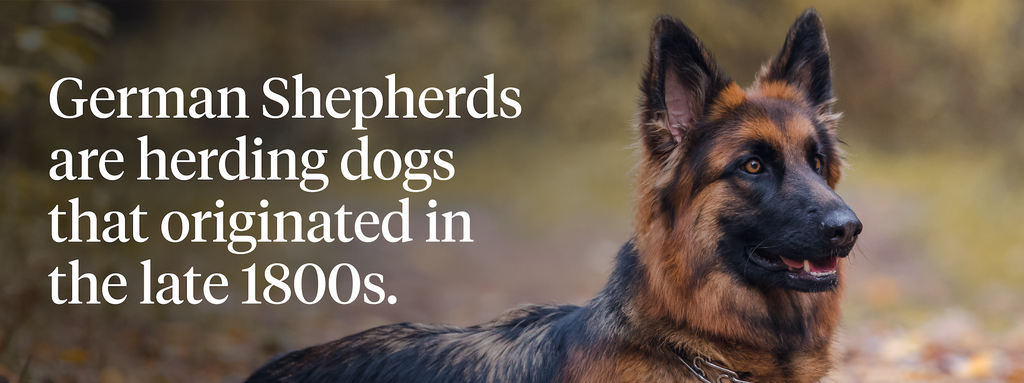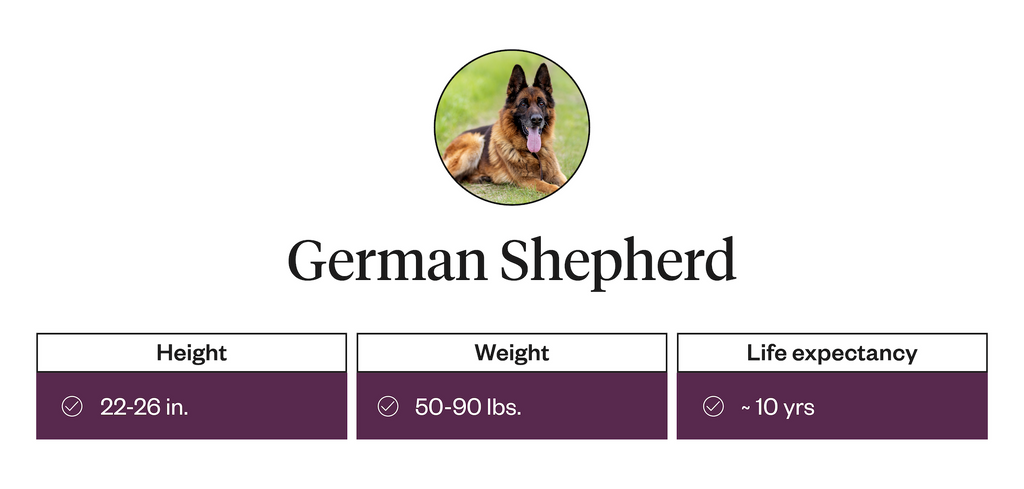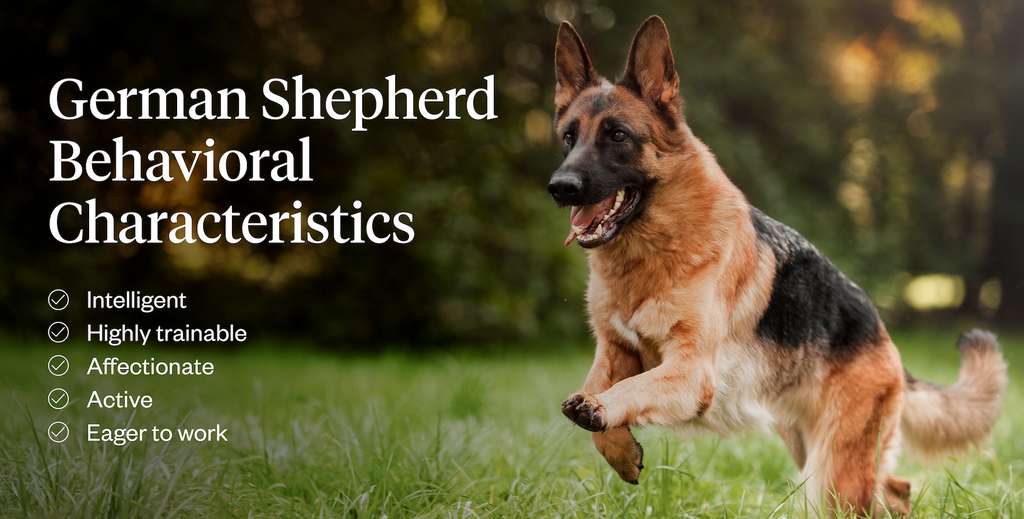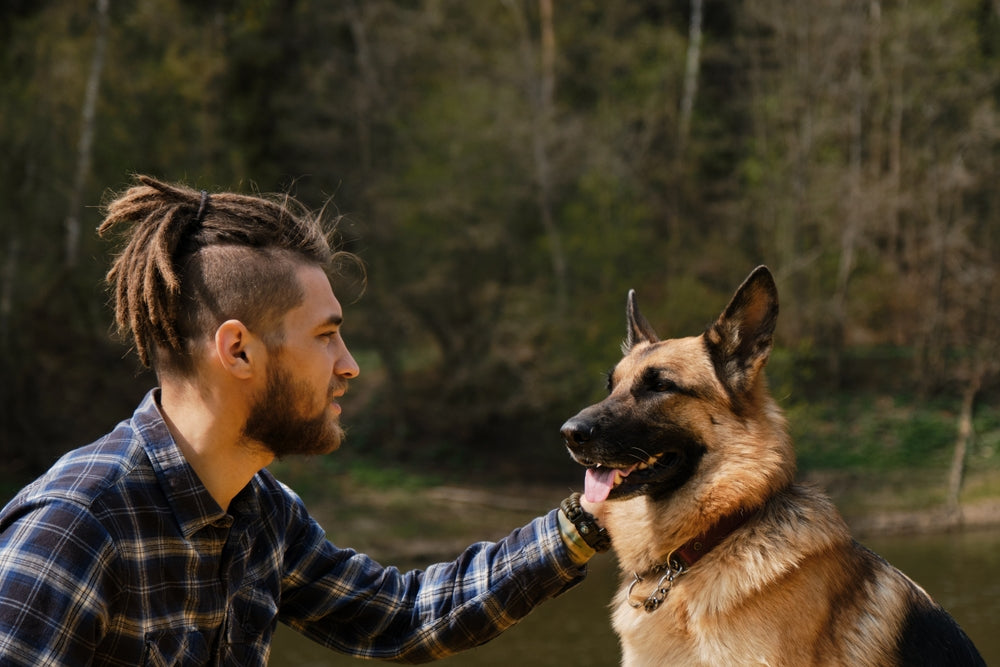8 Min Read
German Shepherd: Pet Profile
Key takeaway
German Shepherds are the world's second most popular dog breed. They're incredibly loyal and affectionate yet protective and vigilant. This working breed requires lots of exercise and mental stimulation, so they're best for active pet parents.

Why pet owners are switching to online vet care with Dutch
-
Prescriptions delivered free to you
-
Fast access to Licensed Vets over video
-
Unlimited video visits and follow-ups
German Shepherds are some of the most popular dogs in the world. As a working breed, you may know them as police and military dogs, but they can also be used as search and rescue dogs or as service animals. German Shepherds are most known for their strength and loyalty, and they can make great family pets for pet parents who love large breeds.
Often intelligent, brave, and confident, these dogs are protective family pets who can make ideal companions for families, but their defining characteristic is their loyalty. Wondering if a German Shepherd is the right dog for you? Keep learning to read more about this courageous breed.
- History & Origin Of German Shepherds
- Physical Attributes
- Behavioral Characteristics
- German Shepherd Care
- Is A German Shepherd Right For Me?
- FAQs
- Final Notes
History & Origin Of German Shepherds
German Shepherds are herding dogs originating in the late 1800s when cavalry officer Captain Max von Stephanitz decided to develop the ideal herding dog.1 Before this, German Shepherds varied in appearance and type. These dogs were bred to protect flocks from predators and herding sheep; they were not considered companion animals and instead served farmers.2
German Shepherds were valued for their intelligence and strength, and the Phylax Society was formed in the late 1800s to create a standardized herding dog.2 Unfortunately, the Society only lasted for a few years. However, others continued to standardize the breed, which resulted in the creation of the German Shepherd as we know it today.
Over time, the predator population declined, and herding dogs were no longer necessary. However, many farmers started to realize how intelligent their dogs were. Captain Max von Stephanitz admired these dogs and purchased a German Shepherd when attending a dog show in 1899 before founding the Society for the German Shepherd Dog.2
This dog, later named Horand, was the product of generations of selective breeding and became the first German Shepherd added to the registry. Horand was the ideal German Shepherd and became the breed standard while fathering many pups of his own as von Stephanitz spent the next few decades refining the breed.1

Physical Attributes
German Shepherds are considered large dogs. Their height ranges from 22-26 inches, with female German Shepherds being a few inches shorter. They can weigh anywhere from 50-90 pounds and have a life expectancy of up to 10 years.1 Of course, a German Shepherd's lifespan may vary depending on their overall health.
This breed is highly recognizable for its wolf-life appearance and brown and black coloring. However, they can come in many colors, with the standard German Shepherd colors ranging from black to white. However, the white German Shepherd is relatively rare compared to the black German Shepherd.1 This breed has long, bushy tails and blanket markings across the back. They have medium-length dense double coats, thick undercoats, and alert, upright ears. However, they're born with their ears down, but they eventually stand up by the time they're six months old.

Behavioral Characteristics
As a working breed, German Shepherds are highly trainable and obedient. However, they're high-energy, so even though they're eager to please, they still need basic training to prevent destructive behavior.
Since they're a large breed, they can easily knock children over, but often get along well with little ones. Still, you should monitor their behavior with kids, since something as simple as a tail wag can be dangerous since they're so powerful.
That said, German Shepherds are incredibly affectionate and love spending time with their pet parents.1 However, they're not always good with other dogs, so they'll need socialization early to prevent fearfulness and anxiety. Socialization at a young age can give your dog the confidence they need in new situations while preventing reactivity, such as barking, lunging, and even biting.
Remember, these dogs were bred to protect livestock, so they're vigilant and protective. They'll alert you when strangers are around and react to potential threats.
Unfortunately, German Shepherds aren't the best apartment dogs because of their size and activity level. As a working breed, they won't be happy being couch potatoes, so they'll need plenty of exercise.1 They also make great running dogs because they love spending time outdoors and require vigorous daily exercise. Additionally, these dogs need tons of space to run and play, so it's usually best to provide them with a large backyard and plenty of adventures.
German Shepherds are loyal and eager to work, requiring lots of attention and mental stimulation. If your dog doesn't have a job, consider finding activities to train their minds and prevent boredom. For example, agility training and nose work are ideal for German Shepherds because they have powerful senses of smell and love being active.

German Shepherd Care
German Shepherds are a strong breed, but they're still prone to certain health conditions. While no breed is free of hereditary health problems, your breeder or the rescue where you adopt your pet can tell you about their health history to help you make the best medical choices for them.
Some of the common conditions German Shepherds are predisposed to include the following:
- Bloat: Bloat is an emergency medical condition that occurs when the stomach fills with air and pressure stops the blood flow in the hind legs and abdomen from returning to the heart.3
- Degenerative myelopathy: Degenerative myelopathy is a spinal cord disease that causes muscle weakness and loss of coordination.4 This inherited neurological disease can’t be cured, but physical therapy may help prevent muscle weakness.
- Elbow & hip dysplasia: Elbow and hip dysplasia are common conditions in large breeds and can contribute to arthritis, lameness, and mobility issues.5 These conditions are hereditary, but factors like how fast a dog grows, weight, and nutrition can worsen the symptoms. There is no cure for hip dysplasia, but weight reduction, exercise restriction, physical therapy, and anti-inflammatory medications can reduce discomfort while improving mobility. Additionally, you can't always prevent arthritis and joint pain in dogs with hip dysplasia, but treatment may reduce discomfort and improve your dog's quality of life.
Aside from being aware of health conditions German Shepherds are prone to, your pet will require proper nutrition, exercise, and grooming. All dogs need age-appropriate kibble or wet food with all the nutrients they need based on their life stage.1 For example, puppies have different nutritional requirements than adult and senior dogs.
Along with what to feed your dog, you should consider how much to feed them. Every dog is different; the more active your dog, the more food they'll need daily. If you need help determining how much to feed your German Shepherd, consult your vet for guidelines based on age, health, and lifestyle.
German Shepherds are a working breed, so they have high energy levels and prefer to have a job. They're highly athletic and need lots of exercise for their physical and mental health.1 German Shepherds who don't get enough exercise may develop behavioral problems, such as destructive behaviors like chewing the carpet or furniture. Therefore, most dogs prefer a large yard to run and play in.
Additionally, you'll need to provide them with mental stimulation to prevent boredom when they can't spend all day outside. You can give your German Shepherd puzzles or train them to perform nose work and sniff out their favorite treats from around the home. These dogs may also benefit from activities for their bodies and minds. For example, activities like agility, herding, tracking, and even swimming can allow them to expel their energy while learning something new.1
Another aspect of good health in dogs is grooming. Fur can attract bacteria and dirt that cause skin irritation and infections, so good grooming is crucial, especially for these dogs with their medium-length, double coats. Luckily, grooming a German Shepherd is relatively easy, and you can get away with brushing them every few days to remove loose hair and prevent shedding on your clothing and furniture. Meanwhile, they'll need occasional baths, depending on their activity level.
In addition to bathing and brushing, keeping your dog's nails short will prevent discomfort and injury. Most dogs need their nails trimmed every month, but some dogs may be able to grind their nails down naturally by walking or running on paved surfaces. Generally, it's time for a trim if you hear your dog's nails when they walk on tile or hardwood floors.
Is A German Shepherd Right For Me?
While German Shepherds are great companion animals, they're not the right dog for everyone. We recommend these dogs for experienced owners who can provide them with tons of physical and mental stimulation while preventing common behavioral concerns. Even better is an owner with an active lifestyle. Since German Shepherds have tons of energy, pet parents must constantly keep them busy.
In addition to regular exercise, German Shepherds need training. Because of their size, they can easily pull you on walks causing injury to you or themselves. Additionally, they can easily knock people over by leaning against them. Socializing your dog early on and investing in obedience training can prevent their size from becoming an issue.
FAQs
Are German Shepherds good family dogs?
German Shepherds are good family dogs. They're often protective and supervise young children at play while remaining affectionate with the entire family. This breed is naturally sweet-natured but requires training to prevent rough play and issues with other dogs and strangers.
What are the five types of German Shepherds?
While all German Shepherds have the same general appearance with variations in coat colors and patterns, there are five different types of this breed, including:
- West German
- East German
- Czech
- American
- European

Final Notes
German Shepherds are among the most popular breeds in the world because they're loyal and affectionate. But, unfortunately, they're not the right dog for everyone because they have extensive exercise requirements to prevent boredom.
Talk to a Dutch vet today for advice on how to care for your German Shepherd. Our licensed vets can diagnose and treat a variety of illnesses in dogs to ensure your pup lives a happy, healthy life. Try Dutch today.Share
References
-
Greenberg, Aurora. "German Shepherd Dog Dog Breed Information." American Kennel Club, 6 Nov. 2017, https://www.akc.org/dog-breeds/german-shepherd-dog/.
-
"History." German Shepherd, https://www.siue.edu/~kbeal/final/history.html.
-
Grognet, Dr. Jeff. "Bloat (or GDV) in Dogs: What Is It and How Is It Treated?" American Kennel Club, 27 Oct. 2022, https://www.akc.org/expert-advice/health/bloat-in-dogs/.
-
"Degenerative Myelopathy." Cornell University College of Veterinary Medicine, 2 Dec. 2022, https://www.vet.cornell.edu/departments-centers-and-institutes/riney-canine-health-center/health-info/degenerative-myelopathy.
-
James, H. K., et al. "Effectiveness of Canine Hip Dysplasia and Elbow Dysplasia Improvement Programs in Six UK Pedigree Breeds." Frontiers, 10 Dec. 2019, https://www.frontiersin.org/articles/10.3389/fvets.2019.00490/full.



